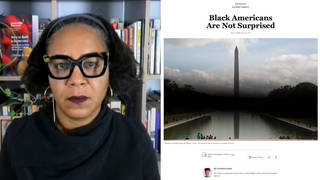
Last week, Boston College announced that Secretary of State Condoleezza Rice would be speaking at this year’s commencement ceremony on May 22nd where she would also be receiving an honorary law degree. Over 200 faculty members have signed a letter in opposition. We host a debate between two Boston College professors on both sides of the issue. [includes rush transcript]
Last week, Boston College announced that Secretary of State Condoleezza Rice would be speaking at this year’s commencement ceremony on May 22nd where she would also be receiving an honorary law degree. Soon after the announcement, two top theologians at the university circulated a letter of opposition among the faculty. As of yesterday, 200 faculty members had signed the letter and more than 1,000 members of the Boston College community have signed a petition opposing the awarding of an honorary degree to Secretary Rice.
An ad hoc faculty group has also sent a letter to the university asking them to rescind the honor. It reads in part, “The Honorary Doctorate of Laws is one of the University’s highest honors, to be bestowed upon individuals worthy of such recognition as a result of highly admirable accomplishments in their personal and professional lives. We believe that Secretary Rice does not deserve this honor, and, to the extent that this degree is presumed to be conferred by the faculty, it is a compromised honor. Although Secretary Rice’s personal biography and scholarly performance are noteworthy indeed, her decisions as National Security Advisor and Secretary of State discredit these achievements. Her statements and actions contradict Jesuit values and teachings on the ethics of war and violence against persons.”
We go now to a debate on the issue.
- Juliet Schor, professor of Sociology at Boston College. Her latest book is “Born to Buy: The Commercialized Child and the New Consumer Culture.” She is also author of “The Overworked American: The Unexpected Decline of Leisure” and “The Overspent American: Upscaling, Downshifting and the New Consumer.”
- Marc Landy, professor in the political science department at Boston College, has written extensively on US politics. He has written several books and articles, including most recently the text book “American Government: Balancing Democracy and Rights.”
Transcript
AMY GOODMAN: We’re joined by Juliet Schor in studio here in Boston. She is the head of the faculty group that drafted the letter. Juliet Schor is a professor of Sociology at Boston College, author of a number of books. Her latest is Born to Buy: The Commercialized Child and the New Consumer Culture, also author of The Overworked American: The Unexpected Decline of Leisure, as well as The Overspent American: Upscaling, Downshifting and the New Consumer. We’re joined on the telephone by Marc Landy. He is professor in the Political Science Department at Boston College and co-author of the textbook, American Government: Balancing Democracy and Rights. We also asked a representative of Boston College to be on the program, but they did not get back to us. We welcome you both to Democracy Now! I want begin with Marc Landy. Why do you support this decision, the honoring of Secretary of State Condoleezza Rice with an honorary degree?
MARC LANDY: Well, let’s start with the most elementary point. She is the Secretary of State of the United States. As members of that political community, it seems to me almost commonsensical that if the second — in my presidency course, I talk about the Secretary of State as the second most important office in the land. Secretary Rice is the Secretary of State. Even as that letter suggests, she’s a person of extraordinary personal qualities, on top of her high office, so, of course, she should get this sort of recognition. We have given it to people far less worthy than her.
AMY GOODMAN: Juliet Schor?
JULIET SCHOR: I think holding office in the minds of many at Boston College is not sufficient criterion for being honored in this way, and we’ve got to look at what the person in office is doing. There are people who hold high government offices all around the world who are not worthy of being honored. Boston College is a values-driven institution. That’s the core of its mission, and it’s the way it advertises itself to the world. This was an opportunistic choice, a kind of let’s get some star power, even if this person is involved in activities which are not only unworthy of being honored, but are illegal and immoral. I mean, this is a person who, not too many years from now, we may be seeing in front of a war crimes tribunal.
AMY GOODMAN: Marc Landy?
MARC LANDY: We didn’t pick a rock star. This woman does not just have star power, she is the representative of a great country, and whereas Juliet or anybody else can be very free to criticize her views and her policies, the idea that she belongs in front of a war tribunal is not something I can dignify with a response. Miss Rice presides over a wide range of choices, a wide range of policies. She’s handled that vast duty with dignity, with honor, and I am perfectly prepared to have a debate about the war in Iraq and the war on terror, but the idea that you can trivialize this person or demonize her, as I’m hearing, simply is not on the table.
AMY GOODMAN: Professor Juliet Schor?
JULIET SCHOR: It’s not trivializing or demonizing. It’s just speaking to the facts. I mean, this is an illegal war. It is an immoral war. This week, the same week that the university made this announcement, the U.S. government was defending itself at a U.N. Commission on Torture, and very much on the defensive. A major report was presented at that commission, showing that the U.S. is involved in “widespread” — and that’s a quote — torture at U.S.-run detention centers all over the world, evidence emerging about extraordinary renditions. One thousand rendition flights now is the number that people are talking about. So, this is very serious business. There is a whole worldwide community out there, which is, you know, many of whom are taking the point of view that the U.S. is involved in war crimes. And as the university’s announcement about this honorary degree recipient notes, the first sentence, she is the major architect of U.S. foreign policy. It’s not trivial at all, Marc.
AMY GOODMAN: Professor Landy?
MARC LANDY: It’s more demonic than trivial. When I responded to the first draft of the letter that I saw, I called it grotesque, and let me see if I can’t explain that. It’s grotesque because it truly distorts our moral compass. The idea that the United States can be castigated in the way that Juliet tries to do it — and covering it with the veneer was U.N. does not get us away from the basic fact: there’s a war on terror going on. We’re faced with responding to groups that have already killed thousands. Saddam killed hundreds and hundreds and hundreds of thousands. U.S. has done things that I’m not proud of, but to try to put our errors and our problems that we have actually prosecuted people for in the same moral dimension as the mass graves of Saddam Hussein, the slaughter of the Kurds, the holocaust against the Shiites is, in fact, a grotesque distortion.
JULIET SCHOR: Well, Marc, we can — you know, we in the United States deal with what our government is doing. I consider myself, as a U.S. citizen, to — my highest priority is to deal with the actions of the United States government, so that’s what I’m focusing on. And there are tens of thousands of people who have been killed in this war. There are already commissions going around this country talking about war crimes. We are using depleted uranium in this war. We are involved in a widespread network of torture. You know, whether or not other people are torturing more persons or killing more persons is really beside the point. In some sense, it doesn’t minimize what our government is doing. I mean, that’s just — we as U.S. citizens have a responsibility to deal with what is being done in our name.
MARC LANDY: We, as U.S. citizens, have the responsibility to take the world in its real dimension and to recognize the magnitude of the dangers we face, to recognize that these examples, which I see no evidence are widespread, just because this commission or that commission is formed. Juliet and I can form a commission tomorrow. The fact remains that you cannot put the sins of the United States and the sins of our adversaries in the same moral category. This is a moral distortion. It prevents us from seeing the world clearly and making the very difficult decisions that we have to make.
JULIET SCHOR: Well, there we have a very fundamental disagreement, Marc, starting from, you know, Hiroshima and Nagasaki to the Vietnam War to the overthrow of a long list of democratically elected governments to the current wars in Afghanistan and Iraq. We just disagree very fundamentally about the nature and scope of U.S. foreign policy and military policy, particularly in the last 50 years. So we can agree to disagree on that. I think that that’s obviously the backdrop here, because the primary objection of faculty to the choice of Secretary Rice is on the policies that she and this administration are carrying out.
I would say a secondary dimension of this is that this is a highly politicized choice. We have a singularly unpopular administration with an extremely unpopular war. They took us to war on the basis of deceptions and distortions. Her own words and activity around selling the war were particularly salient in this regard, and this choice has plunged our community into tremendous divisiveness.
I mean, we stand on the corridor normally together and talk in a happy way, and here we are, you know, at odds with each other on national media. And so, I think that’s testament to the fact that this choice was a gross miscalculation and took away from commencement the character that it should have, which is a happy celebratory day, not one in which our community is at odds with each other, but one in which we should all be focusing on the accomplishments of our graduates happily together.
MARC LANDY: I totally look forward to chatting with Juliet again in the corridor in a cheerful way, but she puts the shoe on the wrong foot. The reason that this has become a contentious issue is because a certain element of the B.C. community —- and, by the way, I haven’t seen the names. I hear 200. I’d like to know if these are 200 signatories from the regular faculty. I look forward to seeing the names. But my point is -—
AMY GOODMAN: Are they, Juliet Schor?
JULIET SCHOR: Yes, as far as I know, they are. The letter went only out to the faculty list. Of course, the petitions that are online, anyone can sign those, and those are a combination.
MARC LANDY: My serious point is that the politicization is done by the enemies of Secretary Rice, not by the invitation. It’s not opportunistic to invite the second most powerful person in the government.
AMY GOODMAN: Well, on that note, we’re going to have to leave it there, because we’ve come to the end of the program. Marc Landy, Professor of Political Science; Juliet Schor, Professor of Sociology at Boston College, debating the honoring of Condoleezza Rice at the college graduation in just a few days.












Media Options